Individual Report: Business Law and Ethics, QUT, 2019
VerifiedAdded on 2022/10/12
|7
|1434
|96
Report
AI Summary
This report presents an analysis of a business law and ethics case study, addressing various ethical frameworks and their application. Part 1 explores descriptive and normative ethics, ethical egoism, and utilitarianism in the context of a product shipment decision. The analysis examines how these ethical approaches influence decision-making, particularly focusing on the potential consequences of actions and the prioritization of self-interest versus the greater good. Part 2 delves into virtue ethics and Kohlberg's stages of moral development, offering insights into how character, virtues, and moral reasoning shape ethical choices within a business scenario. The report emphasizes the importance of honesty and ethical conduct in customer relations, providing a comprehensive overview of ethical considerations in business practice.
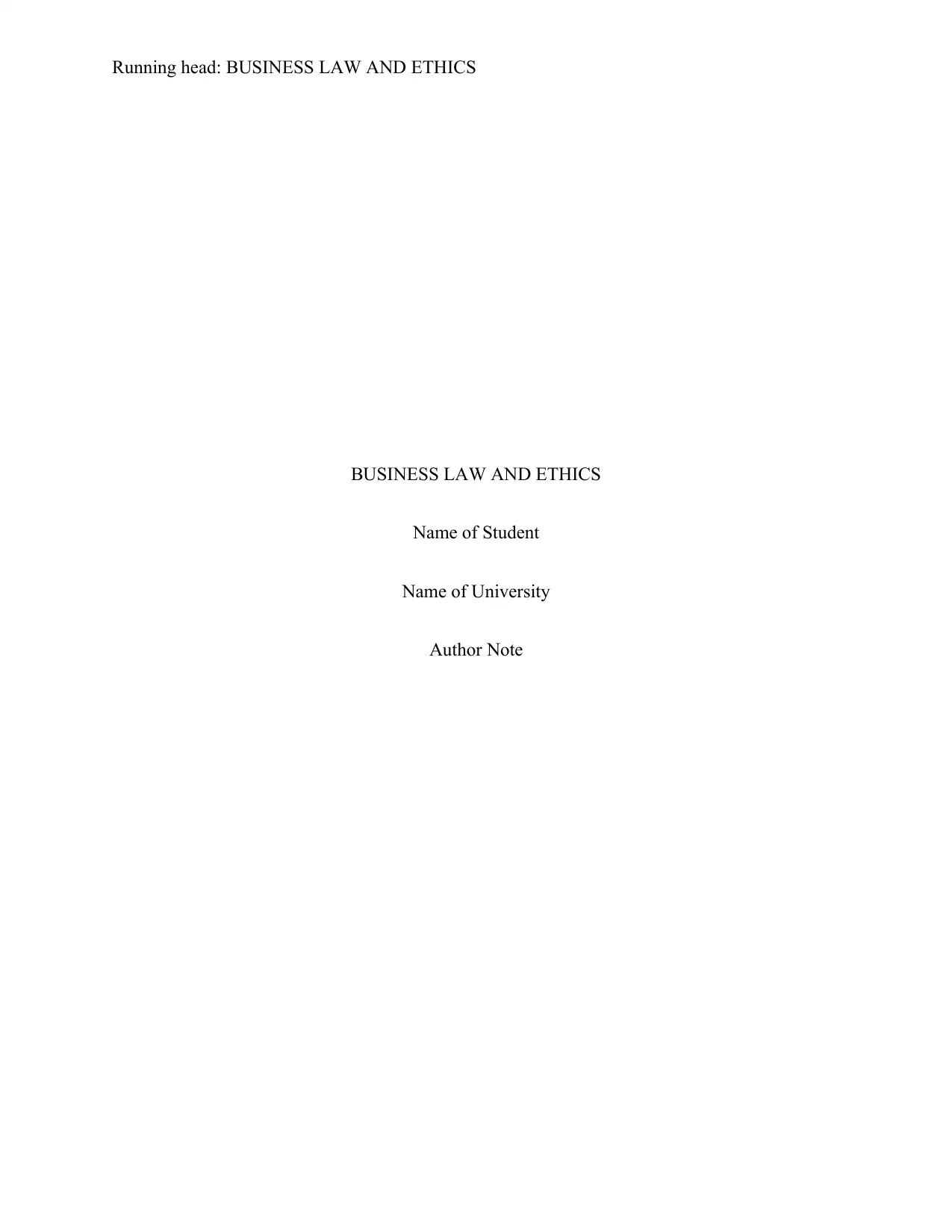
Running head: BUSINESS LAW AND ETHICS
BUSINESS LAW AND ETHICS
Name of Student
Name of University
Author Note
BUSINESS LAW AND ETHICS
Name of Student
Name of University
Author Note
Paraphrase This Document
Need a fresh take? Get an instant paraphrase of this document with our AI Paraphraser
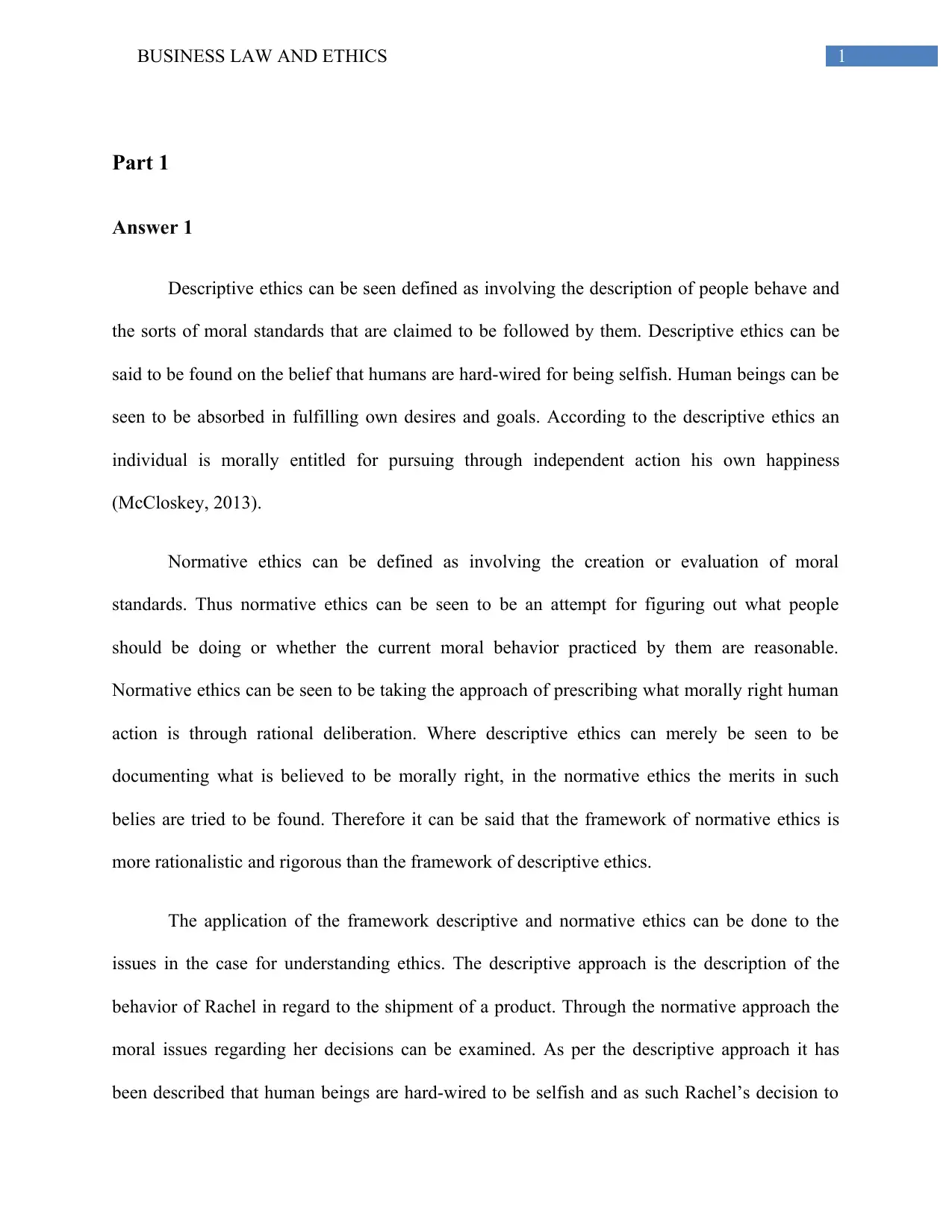
1BUSINESS LAW AND ETHICS
Part 1
Answer 1
Descriptive ethics can be seen defined as involving the description of people behave and
the sorts of moral standards that are claimed to be followed by them. Descriptive ethics can be
said to be found on the belief that humans are hard-wired for being selfish. Human beings can be
seen to be absorbed in fulfilling own desires and goals. According to the descriptive ethics an
individual is morally entitled for pursuing through independent action his own happiness
(McCloskey, 2013).
Normative ethics can be defined as involving the creation or evaluation of moral
standards. Thus normative ethics can be seen to be an attempt for figuring out what people
should be doing or whether the current moral behavior practiced by them are reasonable.
Normative ethics can be seen to be taking the approach of prescribing what morally right human
action is through rational deliberation. Where descriptive ethics can merely be seen to be
documenting what is believed to be morally right, in the normative ethics the merits in such
belies are tried to be found. Therefore it can be said that the framework of normative ethics is
more rationalistic and rigorous than the framework of descriptive ethics.
The application of the framework descriptive and normative ethics can be done to the
issues in the case for understanding ethics. The descriptive approach is the description of the
behavior of Rachel in regard to the shipment of a product. Through the normative approach the
moral issues regarding her decisions can be examined. As per the descriptive approach it has
been described that human beings are hard-wired to be selfish and as such Rachel’s decision to
Part 1
Answer 1
Descriptive ethics can be seen defined as involving the description of people behave and
the sorts of moral standards that are claimed to be followed by them. Descriptive ethics can be
said to be found on the belief that humans are hard-wired for being selfish. Human beings can be
seen to be absorbed in fulfilling own desires and goals. According to the descriptive ethics an
individual is morally entitled for pursuing through independent action his own happiness
(McCloskey, 2013).
Normative ethics can be defined as involving the creation or evaluation of moral
standards. Thus normative ethics can be seen to be an attempt for figuring out what people
should be doing or whether the current moral behavior practiced by them are reasonable.
Normative ethics can be seen to be taking the approach of prescribing what morally right human
action is through rational deliberation. Where descriptive ethics can merely be seen to be
documenting what is believed to be morally right, in the normative ethics the merits in such
belies are tried to be found. Therefore it can be said that the framework of normative ethics is
more rationalistic and rigorous than the framework of descriptive ethics.
The application of the framework descriptive and normative ethics can be done to the
issues in the case for understanding ethics. The descriptive approach is the description of the
behavior of Rachel in regard to the shipment of a product. Through the normative approach the
moral issues regarding her decisions can be examined. As per the descriptive approach it has
been described that human beings are hard-wired to be selfish and as such Rachel’s decision to
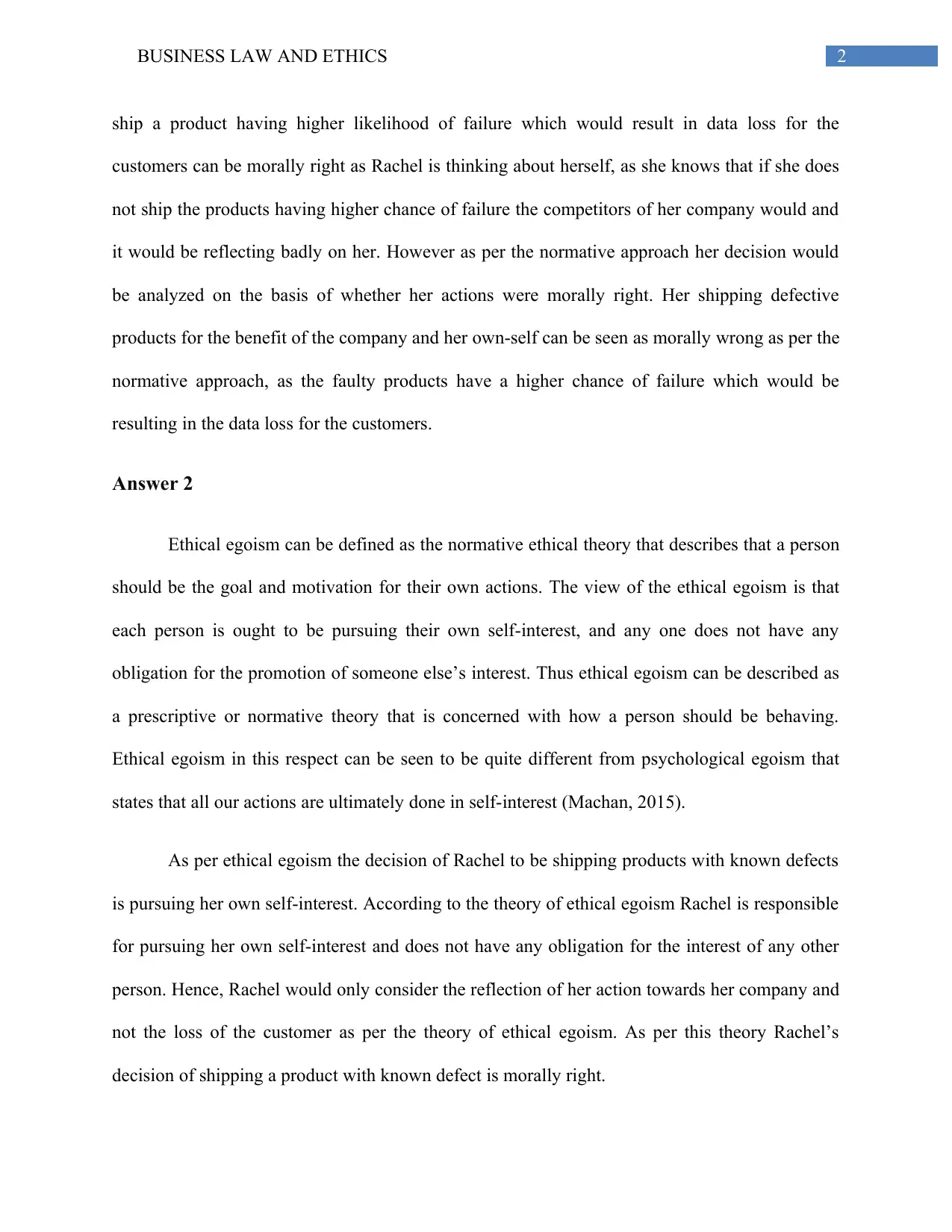
2BUSINESS LAW AND ETHICS
ship a product having higher likelihood of failure which would result in data loss for the
customers can be morally right as Rachel is thinking about herself, as she knows that if she does
not ship the products having higher chance of failure the competitors of her company would and
it would be reflecting badly on her. However as per the normative approach her decision would
be analyzed on the basis of whether her actions were morally right. Her shipping defective
products for the benefit of the company and her own-self can be seen as morally wrong as per the
normative approach, as the faulty products have a higher chance of failure which would be
resulting in the data loss for the customers.
Answer 2
Ethical egoism can be defined as the normative ethical theory that describes that a person
should be the goal and motivation for their own actions. The view of the ethical egoism is that
each person is ought to be pursuing their own self-interest, and any one does not have any
obligation for the promotion of someone else’s interest. Thus ethical egoism can be described as
a prescriptive or normative theory that is concerned with how a person should be behaving.
Ethical egoism in this respect can be seen to be quite different from psychological egoism that
states that all our actions are ultimately done in self-interest (Machan, 2015).
As per ethical egoism the decision of Rachel to be shipping products with known defects
is pursuing her own self-interest. According to the theory of ethical egoism Rachel is responsible
for pursuing her own self-interest and does not have any obligation for the interest of any other
person. Hence, Rachel would only consider the reflection of her action towards her company and
not the loss of the customer as per the theory of ethical egoism. As per this theory Rachel’s
decision of shipping a product with known defect is morally right.
ship a product having higher likelihood of failure which would result in data loss for the
customers can be morally right as Rachel is thinking about herself, as she knows that if she does
not ship the products having higher chance of failure the competitors of her company would and
it would be reflecting badly on her. However as per the normative approach her decision would
be analyzed on the basis of whether her actions were morally right. Her shipping defective
products for the benefit of the company and her own-self can be seen as morally wrong as per the
normative approach, as the faulty products have a higher chance of failure which would be
resulting in the data loss for the customers.
Answer 2
Ethical egoism can be defined as the normative ethical theory that describes that a person
should be the goal and motivation for their own actions. The view of the ethical egoism is that
each person is ought to be pursuing their own self-interest, and any one does not have any
obligation for the promotion of someone else’s interest. Thus ethical egoism can be described as
a prescriptive or normative theory that is concerned with how a person should be behaving.
Ethical egoism in this respect can be seen to be quite different from psychological egoism that
states that all our actions are ultimately done in self-interest (Machan, 2015).
As per ethical egoism the decision of Rachel to be shipping products with known defects
is pursuing her own self-interest. According to the theory of ethical egoism Rachel is responsible
for pursuing her own self-interest and does not have any obligation for the interest of any other
person. Hence, Rachel would only consider the reflection of her action towards her company and
not the loss of the customer as per the theory of ethical egoism. As per this theory Rachel’s
decision of shipping a product with known defect is morally right.
⊘ This is a preview!⊘
Do you want full access?
Subscribe today to unlock all pages.

Trusted by 1+ million students worldwide
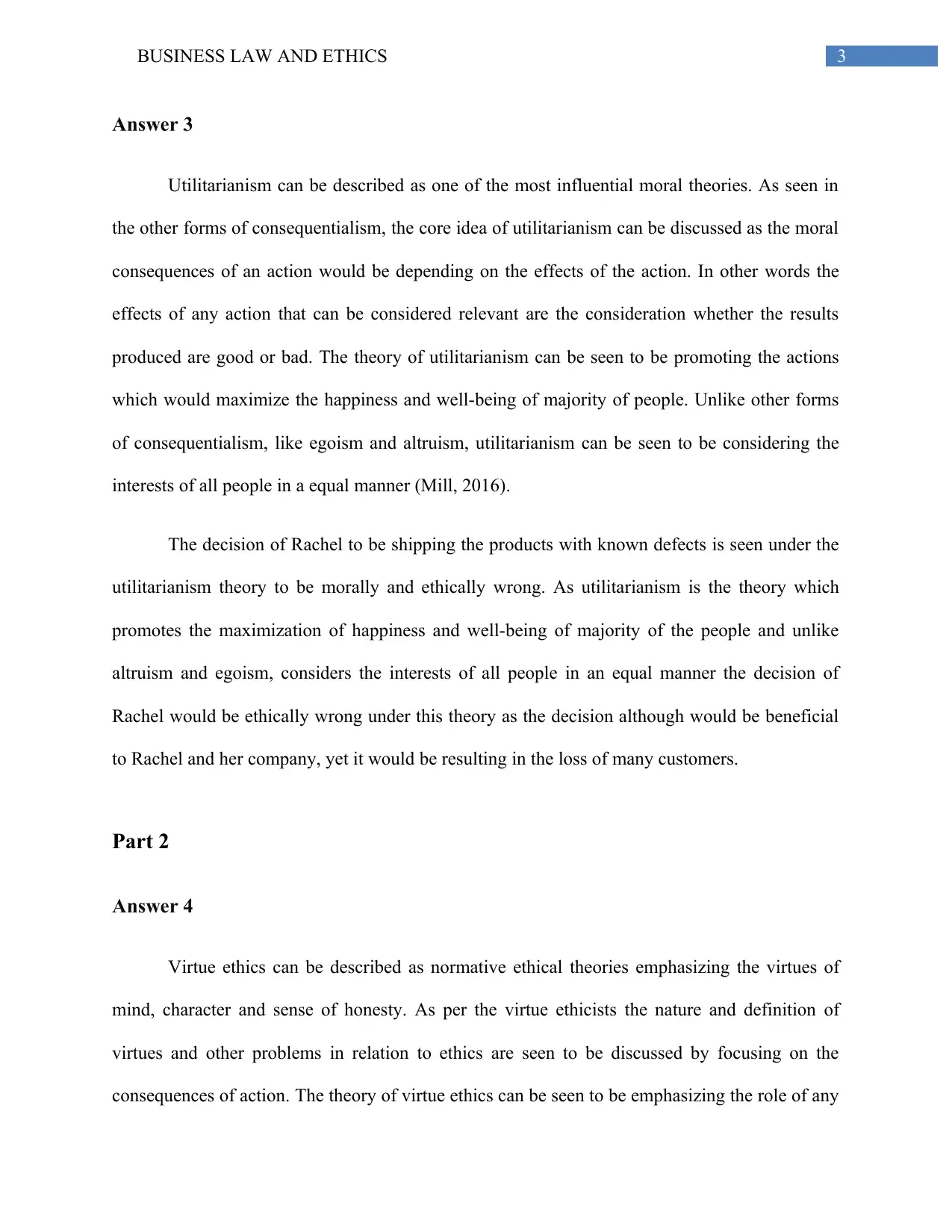
3BUSINESS LAW AND ETHICS
Answer 3
Utilitarianism can be described as one of the most influential moral theories. As seen in
the other forms of consequentialism, the core idea of utilitarianism can be discussed as the moral
consequences of an action would be depending on the effects of the action. In other words the
effects of any action that can be considered relevant are the consideration whether the results
produced are good or bad. The theory of utilitarianism can be seen to be promoting the actions
which would maximize the happiness and well-being of majority of people. Unlike other forms
of consequentialism, like egoism and altruism, utilitarianism can be seen to be considering the
interests of all people in a equal manner (Mill, 2016).
The decision of Rachel to be shipping the products with known defects is seen under the
utilitarianism theory to be morally and ethically wrong. As utilitarianism is the theory which
promotes the maximization of happiness and well-being of majority of the people and unlike
altruism and egoism, considers the interests of all people in an equal manner the decision of
Rachel would be ethically wrong under this theory as the decision although would be beneficial
to Rachel and her company, yet it would be resulting in the loss of many customers.
Part 2
Answer 4
Virtue ethics can be described as normative ethical theories emphasizing the virtues of
mind, character and sense of honesty. As per the virtue ethicists the nature and definition of
virtues and other problems in relation to ethics are seen to be discussed by focusing on the
consequences of action. The theory of virtue ethics can be seen to be emphasizing the role of any
Answer 3
Utilitarianism can be described as one of the most influential moral theories. As seen in
the other forms of consequentialism, the core idea of utilitarianism can be discussed as the moral
consequences of an action would be depending on the effects of the action. In other words the
effects of any action that can be considered relevant are the consideration whether the results
produced are good or bad. The theory of utilitarianism can be seen to be promoting the actions
which would maximize the happiness and well-being of majority of people. Unlike other forms
of consequentialism, like egoism and altruism, utilitarianism can be seen to be considering the
interests of all people in a equal manner (Mill, 2016).
The decision of Rachel to be shipping the products with known defects is seen under the
utilitarianism theory to be morally and ethically wrong. As utilitarianism is the theory which
promotes the maximization of happiness and well-being of majority of the people and unlike
altruism and egoism, considers the interests of all people in an equal manner the decision of
Rachel would be ethically wrong under this theory as the decision although would be beneficial
to Rachel and her company, yet it would be resulting in the loss of many customers.
Part 2
Answer 4
Virtue ethics can be described as normative ethical theories emphasizing the virtues of
mind, character and sense of honesty. As per the virtue ethicists the nature and definition of
virtues and other problems in relation to ethics are seen to be discussed by focusing on the
consequences of action. The theory of virtue ethics can be seen to be emphasizing the role of any
Paraphrase This Document
Need a fresh take? Get an instant paraphrase of this document with our AI Paraphraser
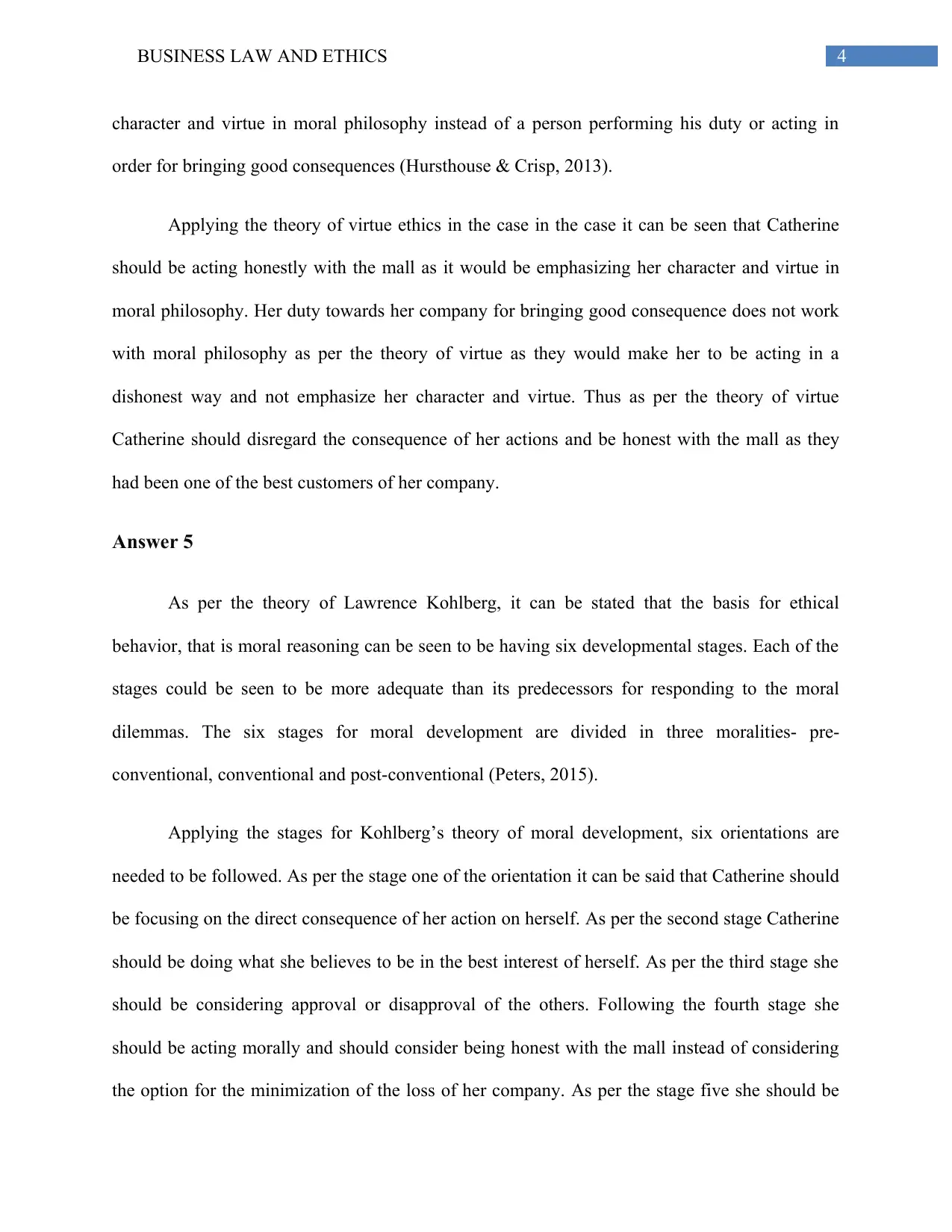
4BUSINESS LAW AND ETHICS
character and virtue in moral philosophy instead of a person performing his duty or acting in
order for bringing good consequences (Hursthouse & Crisp, 2013).
Applying the theory of virtue ethics in the case in the case it can be seen that Catherine
should be acting honestly with the mall as it would be emphasizing her character and virtue in
moral philosophy. Her duty towards her company for bringing good consequence does not work
with moral philosophy as per the theory of virtue as they would make her to be acting in a
dishonest way and not emphasize her character and virtue. Thus as per the theory of virtue
Catherine should disregard the consequence of her actions and be honest with the mall as they
had been one of the best customers of her company.
Answer 5
As per the theory of Lawrence Kohlberg, it can be stated that the basis for ethical
behavior, that is moral reasoning can be seen to be having six developmental stages. Each of the
stages could be seen to be more adequate than its predecessors for responding to the moral
dilemmas. The six stages for moral development are divided in three moralities- pre-
conventional, conventional and post-conventional (Peters, 2015).
Applying the stages for Kohlberg’s theory of moral development, six orientations are
needed to be followed. As per the stage one of the orientation it can be said that Catherine should
be focusing on the direct consequence of her action on herself. As per the second stage Catherine
should be doing what she believes to be in the best interest of herself. As per the third stage she
should be considering approval or disapproval of the others. Following the fourth stage she
should be acting morally and should consider being honest with the mall instead of considering
the option for the minimization of the loss of her company. As per the stage five she should be
character and virtue in moral philosophy instead of a person performing his duty or acting in
order for bringing good consequences (Hursthouse & Crisp, 2013).
Applying the theory of virtue ethics in the case in the case it can be seen that Catherine
should be acting honestly with the mall as it would be emphasizing her character and virtue in
moral philosophy. Her duty towards her company for bringing good consequence does not work
with moral philosophy as per the theory of virtue as they would make her to be acting in a
dishonest way and not emphasize her character and virtue. Thus as per the theory of virtue
Catherine should disregard the consequence of her actions and be honest with the mall as they
had been one of the best customers of her company.
Answer 5
As per the theory of Lawrence Kohlberg, it can be stated that the basis for ethical
behavior, that is moral reasoning can be seen to be having six developmental stages. Each of the
stages could be seen to be more adequate than its predecessors for responding to the moral
dilemmas. The six stages for moral development are divided in three moralities- pre-
conventional, conventional and post-conventional (Peters, 2015).
Applying the stages for Kohlberg’s theory of moral development, six orientations are
needed to be followed. As per the stage one of the orientation it can be said that Catherine should
be focusing on the direct consequence of her action on herself. As per the second stage Catherine
should be doing what she believes to be in the best interest of herself. As per the third stage she
should be considering approval or disapproval of the others. Following the fourth stage she
should be acting morally and should consider being honest with the mall instead of considering
the option for the minimization of the loss of her company. As per the stage five she should be
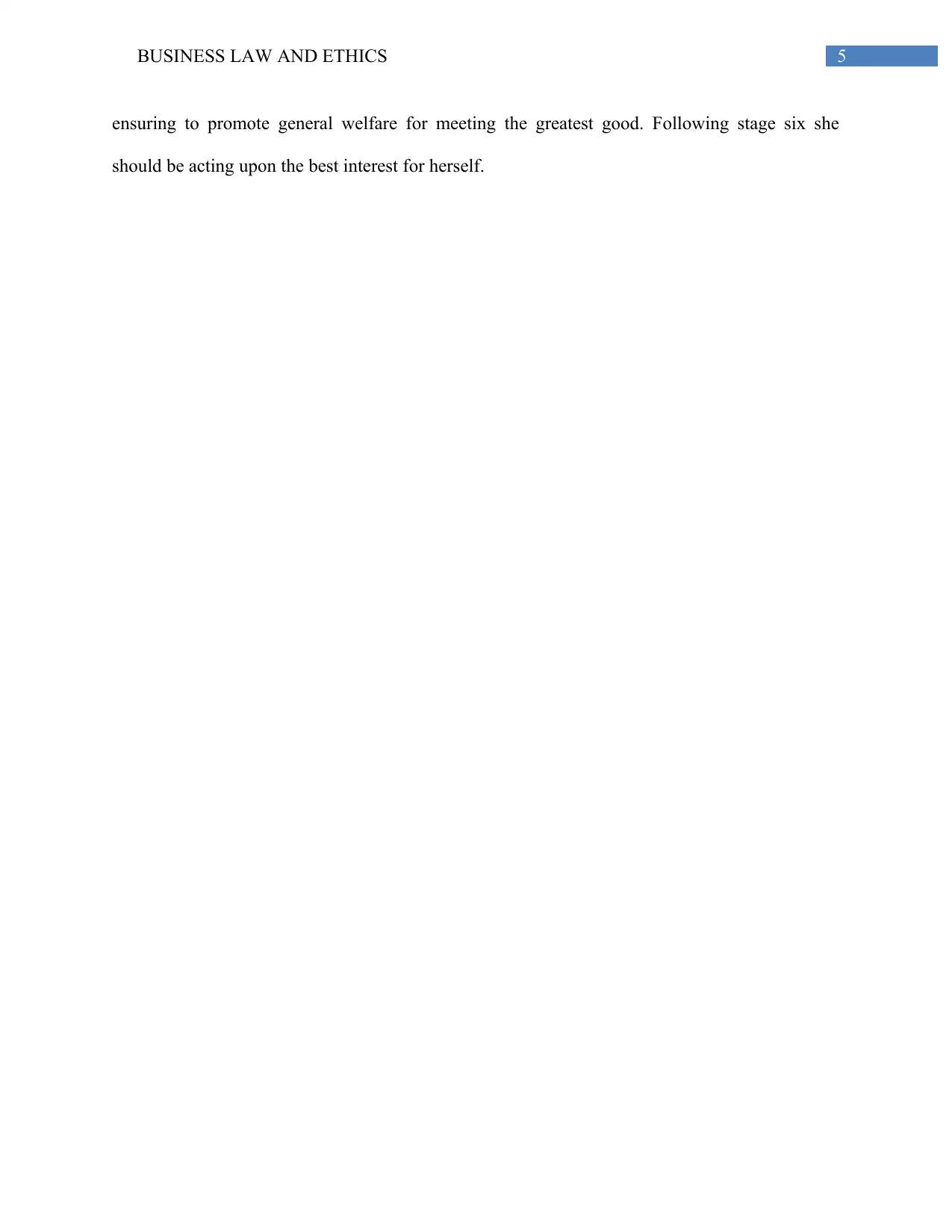
5BUSINESS LAW AND ETHICS
ensuring to promote general welfare for meeting the greatest good. Following stage six she
should be acting upon the best interest for herself.
ensuring to promote general welfare for meeting the greatest good. Following stage six she
should be acting upon the best interest for herself.
⊘ This is a preview!⊘
Do you want full access?
Subscribe today to unlock all pages.

Trusted by 1+ million students worldwide
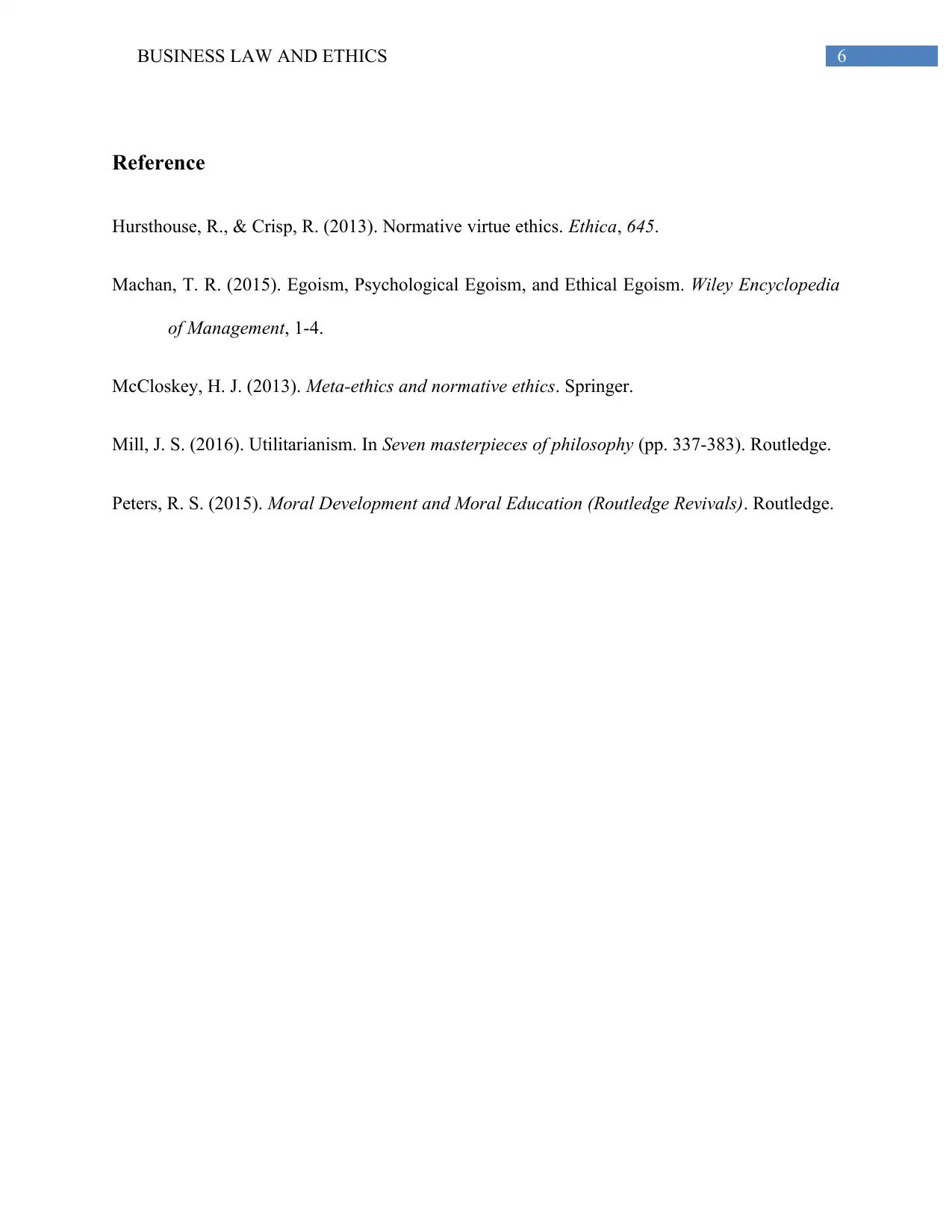
6BUSINESS LAW AND ETHICS
Reference
Hursthouse, R., & Crisp, R. (2013). Normative virtue ethics. Ethica, 645.
Machan, T. R. (2015). Egoism, Psychological Egoism, and Ethical Egoism. Wiley Encyclopedia
of Management, 1-4.
McCloskey, H. J. (2013). Meta-ethics and normative ethics. Springer.
Mill, J. S. (2016). Utilitarianism. In Seven masterpieces of philosophy (pp. 337-383). Routledge.
Peters, R. S. (2015). Moral Development and Moral Education (Routledge Revivals). Routledge.
Reference
Hursthouse, R., & Crisp, R. (2013). Normative virtue ethics. Ethica, 645.
Machan, T. R. (2015). Egoism, Psychological Egoism, and Ethical Egoism. Wiley Encyclopedia
of Management, 1-4.
McCloskey, H. J. (2013). Meta-ethics and normative ethics. Springer.
Mill, J. S. (2016). Utilitarianism. In Seven masterpieces of philosophy (pp. 337-383). Routledge.
Peters, R. S. (2015). Moral Development and Moral Education (Routledge Revivals). Routledge.
1 out of 7
Related Documents
Your All-in-One AI-Powered Toolkit for Academic Success.
+13062052269
info@desklib.com
Available 24*7 on WhatsApp / Email
![[object Object]](/_next/static/media/star-bottom.7253800d.svg)
Unlock your academic potential
Copyright © 2020–2026 A2Z Services. All Rights Reserved. Developed and managed by ZUCOL.





